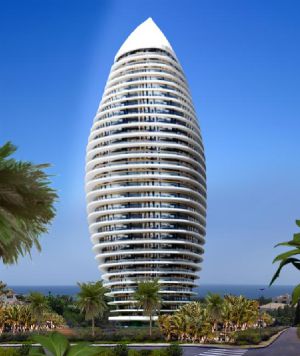 Simulación de la torre que planea Sierra Blanca Properties en Marbella.
Simulación de la torre que planea Sierra Blanca Properties en Marbella.
Marbella no quiere ser Benidorm. Ni Singapur, Hong Kong o Dubai. La ciudad, símbolo durante años de la corrupción y el urbanismo destripaterrones, se ha levantado contra el plan que el Ayuntamiento, del PP, aprobó el pasado 22 de noviembre y que autoriza la construcción de cinco rascacielos de hasta 50 plantas cada uno. La alcaldesa, Ángeles Muñoz, ha anunciado que renuncia a la idea, pero el caso deja muchas lecturas: se reactiva la construcción en la costa más exclusiva y, contra pronóstico, en Marbella ha surgido un movimiento contra ella.
Pedro Rodríguez, presidente de la promotora Sierra Blanca Properties, no entiende por qué su plan para levantar una torre de 30 plantas en Marbella ha sublevado a buena parte de la ciudad. “Marbella tiene que competir en el mundo, con Dubai, Miami o Singapur, y este proyecto mete a la ciudad en el siglo XXI”, explica en su despacho.
La oficina está a las afueras de Marbella, en la llamada milla de oro, junto a un centro comercial en cuyo aparcamiento abundan todoterrenos y coches de alta gama. Alrededor hay villas bajas pintadas en tonos ocre, piscinas, vallas altas, césped y palmeras. En la cafetería atienden en inglés. Podría ser Miami o California.
Rodríguez explica en su mesa llena de papeles cómo ve el futuro de la construcción en Marbella. “No tiene sentido construir si no haces algo excepcional. El producto de precio medio está en los bancos y en la Sareb [el banco malo] a precio muy bajo, así que hay que ir a por lo exclusivo”. Él, que ha capeado la crisis construyendo y vendiendo villas de lujo para extranjeros, creía poder dar el salto definitivo. Presentó al Ayuntamiento una torre de 30 plantas y 115 metros de altura. Su intención era vender 114 apartamentos de lujo de más de 300 metros cuadrados por, como mínimo, un millón y medio de euros cada uno.
La idea de Rodríguez, pulcro afeitado, jersey de pico sin corbata y pelo repeinado, nace en Nueva York. Allí vivió durante años hasta que a mitad de los ochenta volvió a España. Explica que un chalé con piscina es caro de mantener y engorroso para quien solo pretende usarlo por temporadas. Una torre de lujo, sostiene, elimina esos inconvenientes. Y tiene una gran ventaja: tiene vistas al mar, algo que en Marbella empieza a escasear y que demandan los extranjeros, entre los que destacan los rusos. El promotor insiste en que la financiación no es problema y que podría vender los pisos antes de poner un ladrillo.
Podría sonar a baladronada, a otro castillo en el aire, pero en la ciudad todo el mundo le toma en serio. Rodríguez ha sido presidente de los empresarios de Marbella y no suele ir de farol. Nacido en Calzada de Calatrava (Ciudad Real) en 1947, tiene una biografía meritoria. Con nueve años comienza a trabajar en el campo y ayudando en la carnicería a su padre. De chaval se va a estudiar a Madrid, donde demuestra facilidad para los idiomas. Con distintos empleos se paga los estudios y aprende inglés y francés. Es el boom del turismo y Rodríguez entra en una agencia de viajes y después en una aerolínea.
Va a Nueva York y monta una agencia de viajes mayorista a España: Hispanidad Travel. Hace fortuna y abre oficinas en México, Miami y Madrid. “En 1985, cuando España entraba en la UE leí un libro llamadoMegatrends en el que explicaba que del norte de EE UU se estaba produciendo una migración hacia el sur, al cinturón del sol, porque las empresas ahorraban costes y la calidad de vida era mejor. Pensé que algo similar ocurriría en Europa y vine a Marbella”. La torre, que asegura que tendría la firma de Ricardo Bofill, culminaría esa historia de hombre hecho a sí mismo.
El 22 de noviembre el pleno municipal de Marbella sacó adelante, con la mayoría absoluta del PP, una “modificación puntual de elementos del Plan General de Ordenación Urbanística”, aprobado tres años antes para enterrar definitivamente el gilismo.
La aprobación inicial daba un mes de plazo para alegaciones. Nada más conocer el edicto, Carola Herrero fue una de las personas que se levantó contra los rascacielos. Esta arquitecta coordina la plataforma contra las torres. Es simbólico que no son los ecologistas los que más se han movido, sino urbanistas y promotores. En la cafetería de un hotel de Marbella, los coordinadores de la plataforma relatan sus pegas.
Allí está Rafael de la Fuente, un hombre afable de 72 años que fue concejal del PP en Marbella y exdirector de los hoteles de lujo de Monteros y Don Carlos, en Marbella, y Villamagna, en Madrid, entre otros. “Las alturas son muy peligrosas. De joven vi cómo las torres arruinaron Torremolinos. Era el primer destino turístico de España y en seis años lo destrozaron. La gente que viene del norte de Europa no quiere eso. Marbella es único y no podemos destrozarlo”.
“Mejora el bienestar de la población”
El pleno municipal de Marbella aprobó el pasado 22 de noviembre “una nueva tipología edificatoria singular en altura” y al ser una modificación puntual en principio no precisa el visto bueno de la Junta de Andalucía, del PSOE e IU.
El acuerdo define que los rascacielos podrán ir en cinco zonas de la ciudad, entre ellas la conocida como “la gitana”, la que tiene la categoría urbanística más avanzada y que es donde Pedro Rodríguez ha presentado su proyecto.
El documento que sustenta el edicto explica que los rascacielos “conllevan unas mejoras para el bienestar de la población por llevar implícita una revitalización de las áreas urbanas donde se implanten”
A su lado está el promotor Juan de Orbaneja: “Por muy bonita que pongas una torre rompe el paisaje y conlleva un efecto dominó: luego vendrán más y no podremos pararlas”. No es que en Marbella no haya edificios, pero es verdad que conserva un perfil relativamente homogéneo. “Ni Gil se atrevió a plantear rascacielos. El mayor lo hizo el marqués de Villaverde y tiene 20 plantas. Cuando Franco lo vio le preguntó que qué era eso. Le dijo que era la primera de un complejo y que al lado irían nueve más. Franco lo paró”, apostilla Carola Herrero.
El impulsor de la torre cree que las críticas al estilo son inventos. “¿Cuál es el estilo arquitectónico de la ciudad o arquitectura marbellí? En Marbella existen varios estilos, desde el centro árabe, edificios del desarrollismo o urbanizaciones anglosajonas. Incluso hay al menos cuatro torres”. Añade que el PGOU en vigor contempla la construcción de varias torres más y el proyecto del puerto que anunció el jeque Al Thani incluye rascacielos.
¿Qué habría pasado si Gil hubiera propuesto estos rascacielos? Los opositores creen que la ciudad se habría levantado, pero hay motivos para dudarlo. Antonio Flores, un abogado especializado en clientes extranjeros, opina que la Operación Malaya ha vacunado a la población: “La gente aquí ya no ve a los promotores como gente que busque el bien común. Ahora recela de los grandes planes urbanísticos”. Ni las promesas de empleo han evitado una dura campaña en la prensa contra el proyecto.
Tanto, que el Ayuntamiento ha plegado velas. Desde el consistorio se insiste en que solo fue una idea y que como no hay consenso no se hará. “Ha habido demagogia y poca información”, y añaden que la intención del equipo de Gobierno era “generar riqueza y empleo con garantías y sin incrementar el volumen”.
Aun así, el Ayuntamiento no ha aclarado si va a revocar el acuerdo del pleno o si el parón es solo de palabra. Temiendo esto segundo, la plataforma sigue activa y recabando apoyos contra el plan. De la Fuente destaca la imagen que puede sacar Marbella de esto tras las mayorías absolutas que concedió al gilismo una y otra vez: “Quizá así mostremos que no somos un pueblo de descerebrados y maleantes”.

 La torre tendría 30 plantas y 114 apartamentos de lujo.
La torre tendría 30 plantas y 114 apartamentos de lujo.
 A call centre, crucial to the fraud, was based in an office in Fuengirola
A call centre, crucial to the fraud, was based in an office in Fuengirola
 Muldoon’s villa in Campo Mijas has also been seized as an asset
Muldoon’s villa in Campo Mijas has also been seized as an asset Jason Coghlan
Jason Coghlan

